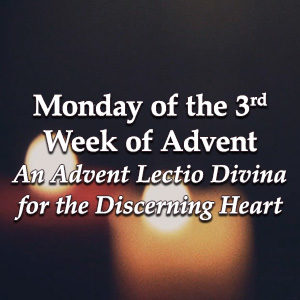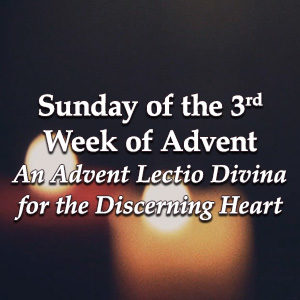Podcast: Play in new window | Download (Duration: 8:31 — 6.0MB) | Embed
Subscribe: Apple Podcasts | Spotify | Amazon Music | Android | Pandora | iHeartRadio | JioSaavn | Podchaser | Gaana | Podcast Index | Email | TuneIn | Deezer | Anghami | RSS | More
Friday of the 3rd week of Advent – An Advent Lectio Divina for the Discerning Heart
 From the book of Genesis 7:24-30
From the book of Genesis 7:24-30
Jacob called his sons and said:
‘Gather round, sons of Jacob, and listen;
listen to Israel your father.
Judah, your brothers shall praise you:
you grip your enemies by the neck,
your father’s sons shall do you homage,
Judah is a lion cub,
you climb back, my son, from your kill;
like a lion he crouches and lies down,
or a lioness: who dare rouse him?
The sceptre shall not pass from Judah,
nor the mace from between his feet,
until he come to whom it belongs,
to whom the peoples shall render obedience.’
What word made this passage come alive for you?
What did you sense the Lord saying to you?
Once more give the Lord an opportunity to speak to you:
Jacob called his sons and said:
‘Gather round, sons of Jacob, and listen;
listen to Israel your father.
Judah, your brothers shall praise you:
you grip your enemies by the neck,
your father’s sons shall do you homage,
Judah is a lion cub,
you climb back, my son, from your kill;
like a lion he crouches and lies down,
or a lioness: who dare rouse him?
The sceptre shall not pass from Judah,
nor the mace from between his feet,
until he come to whom it belongs,
to whom the peoples shall render obedience.’
What did your heart feel as you listened?
What did you sense the Lord saying to you?
Once more, through Him, with Him and in Him listen to the Word:
Jacob called his sons and said:
‘Gather round, sons of Jacob, and listen;
listen to Israel your father.
Judah, your brothers shall praise you:
you grip your enemies by the neck,
your father’s sons shall do you homage,
Judah is a lion cub,
you climb back, my son, from your kill;
like a lion he crouches and lies down,
or a lioness: who dare rouse him?
The sceptre shall not pass from Judah,
nor the mace from between his feet,
until he come to whom it belongs,
to whom the peoples shall render obedience.’
What did your heart feel as you prayed?
What do you hope to carry with you from this time with the Lord?
Our Father, who art in heaven,
hallowed be thy name.
Thy kingdom come.
Thy will be done on earth, as it is in heaven.
Give us this day our daily bread,
and forgive us our trespasses,
as we forgive those who trespass against us,
and lead us not into temptation,
but deliver us from evil.
May the Lord bless us, and keep us from all evil, and bring us to everlasting life.
Amen
Excerpt from THE JERUSALEM BIBLE, copyright (c) 1966 by Darton, Longman & Todd, Ltd. and Doubleday, a division of Penguin Random House, Inc. Reprinted by Permission.

 From the Holy Gospel According to St. Luke 7:24-30
From the Holy Gospel According to St. Luke 7:24-30 From the Holy Gospel According to St. Luke 7:19-23
From the Holy Gospel According to St. Luke 7:19-23
 From the Holy Gospel According to St. Matthew 21:28-32
From the Holy Gospel According to St. Matthew 21:28-32 From the Holy Gospel According to St. Matthew 17:10-13
From the Holy Gospel According to St. Matthew 17:10-13 From the Holy Gospel According to St. Matthew 17:10-13
From the Holy Gospel According to St. Matthew 17:10-13 From the Holy Gospel According to St. Matthew 17:10-13
From the Holy Gospel According to St. Matthew 17:10-13 From the Holy Gospel According to St. Matthew 11:16-19
From the Holy Gospel According to St. Matthew 11:16-19 From the Holy Gospel According to St. Luke 1:26-38
From the Holy Gospel According to St. Luke 1:26-38